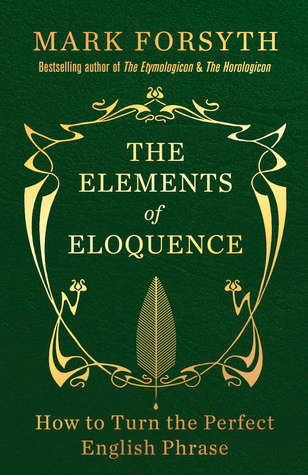Published by Icon Books Ltd, 2014, softcover, 206 pages, condition: as new. In an age unhealthily obsessed with substance, this is a book on the importance of pure style, from the bestselling author of The Etymologicon and The Horologicon. From classic poetry to pop lyrics and from the King James Bible to advertising slogans, Mark Forsyth explains the secrets that make a phrase such as Tiger, Tiger, burning bright, or To be or not to be memorable.
In his inimitably entertaining and witty style he takes apart famous lines and shows how you too can write like Shakespeare or Oscar Wilde. Whether you're aiming for literary immortality or just an unforgettable one-liner, The Elements of Eloquence proves that you don't need to have anything to say you simply need to say it well. Witty, clever, fascinating, compulsive, delightful. That first sentence is an example of Scesis Onomaton and merely five of the words I use to describe myself well, and this book too, obviously. To be honest, Im not going to remember the names of all of the rules that are discussed here. You could, if the mood took you, do exactly that and learn all of the Greek names for the rhetorical tricks discussed here, but I dont think that is completely necessary. What this very short book does beautifully is to give you a series of examples of what works in forming a lovely, memorable sentence and, more importantly, why it works. It also shows you, if not used properly, why these tricks also might not work.
And this guy is funny often making me stop and chuckle to myself in a way that made me glad I wasnt reading this book on a train. Now, that isnt necessarily what I had expected to happen while reading a book on rhetoric. Ive read Aristotles rhetoric too, years ago, and cant remember a single smile, never mind a chortle. One of the things that I found particularly interesting in this was how often symmetry played a part in making sentences beautiful and memorable. Or how frequently adding colours to sentences set them off. So, jealousy doesnt just look deep into your soul, but it is the green-eyed monster, jealousy that does. Beautiful sentences are often formed by the unexpected, however, the problem is that after it has struck us as beautiful, it too often becomes overused and conventional and so, the surprise factor diminishes with time and so too does the beauty. We are constantly open to new surprises and constantly in the process of becoming bored with things that surprised us yesterday, but no longer do today. I think this is why humour ages so badly.
This book shows us that there are structural rules about how to go about making these surprises. You will probably know about lots and lots of what is discussed in this book and it is just possible that you will learn nothing from it at all although, I have to say that I learnt a lot and I have been pretty interested in this stuff for quite some time all the same, even if you know this stuff like the back of your hand, buy this book anyway. The book is so well put together that, well, it just gives you a good feeling reading it: it is delightful, it is charming. I just love watching people smarter than me doing endlessly clever things. This guy explaining why some of the most memorable sentences in our language are, in fact, memorable, is a joy to watch. I particularly loved it when he made simple changes to our most memorable sentences to show how they needed to be just as they are. Or, even better, when he showed how we misremember sentences from books or plays, but actually, our misremembering improves the sentences according to one of the rules discussed here.

